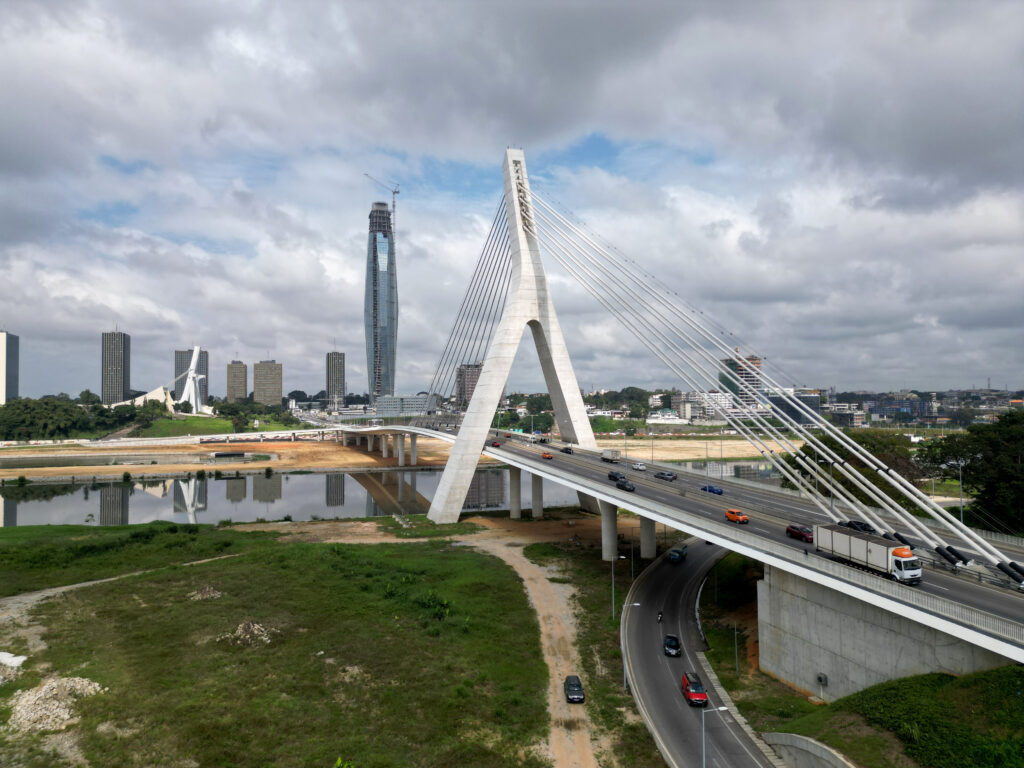Touting himself as the prime mover behind the transformation of Ivory Coast’s economy over 14 years in office, Alassane Ouattara hopes that revamp can help secure him a fourth presidential term Saturday.Ouattara, 83, came to power in the world’s biggest cocoa producer on the back of a political and military crisis but strong growth and investment since then has bolstered his position.The visible transformation of economic capital Abidjan is an undeniable factor set to underpin support for the incumbent.”We Ivorians never imagined we could have bridges, interchanges, and major roads like this!” exclaimed Moustapha, a tour guide, during a long guided tour for AFP of the city.Moustapha makes no secret of the fact that he will vote for “ADO” precisely because the president has carried out a “metamorphosis” of French-speaking West Africa’s megacity with some seven million inhabitants, almost twice as many as it had in 2000.The revamp began with construction of three imposing new bridges spanning the Ebrie Lagoon and several road interchanges.- “China Mall” -The most eye-catching is a cable-stayed bridge, inaugurated in August 2023, linking the well-heeled district of Cocody to the Plateau historic business centre.The bridge has become an iconic image for Abidjan — Moustapha dubs it a “magnificent holiday attraction for tourists and families.”Under construction is another arresting project — “Tower F”, a futuristic 421-metre (1,380-feet) skyscraper which when finished will loom as a giant over the city.Growth under Ouattara has averaged six percent since 2012, leading to a burgeoning middle class.During his 14 years in power 11 hypermarkets and 59 supermarkets have opened, the government says, including “China Malls” and department stores which illustrate a growing Chinese retail presence.A glance at people’s choice of vehicle brings further evidence of economic transformation.”Here you find luxury cars that you don’t even see in Europe,” joked Moustapha from the wheel of a nippy little Suzuki.The small Japanese city cars now make up a large portion of vehicles on Abidjan’s streets since a law was passed regulating imports and pushing aside second-hand cars from Europe.The city now stretches as far eastwards as far as Bingerville, which was the first capital of the French colony in the early decades of the last century.Taking the Y4, an expressway still under construction, allows one to realise just “how much the city has eaten into the bush” that surrounds it, said Moustapha.The road passes near the imposing 60,000-capacity Alassane Ouattara Olympic Stadium of Ebimpe that was built for last year’s Africa Cup of Nations.In all, the government says Abidjan saw the completion of 277 kilometres (172 miles) of roads and 413 km of streets between 2011 and 2025.- “You don’t eat tar” -Despite the achievements, many deplore the accompanying cost of such urban development.”You don’t eat tar,” is an oft-heard comment.”Everything has become very expensive,” Moustapha conceded.Monthly rent for a studio apartment in Abidjan can easily come in at 100 euros, almost the minimum wage.Several opposition figures have criticised infrastructure with limited social benefits they say won’t cut poverty, which a recent World Bank report put at some 46 percent.”Social inequalities persist, youth unemployment remains high, and the benefits of growth have not always reached the most vulnerable groups,” local media say.Many residents of densely-populated areas live in precarious conditions, treading through dust and living beneath tin shacks, a far cry from the lavish “Beverly Hills”-style villas of Cocody where ministers and football stars reside.To the west lies the vast and popular Yopougon district, where former president Laurent Gbagbo, who lost out to Ouattara in the 2010 election, enjoys support.Gbagbo is barred from standing in Saturday’s poll owing to a criminal conviction, meaning Ouattara looks set to retain his hold on power.- ‘Great frustrations’ -On the south side of the city, the expatriate-heavy and Lebanese neighbourhoods of Marcory/Zone 4 are overlooked by brand-new “luxury” buildings, an Ivorian imitation of Dubai.Construction machinery and workers beaver away as Abidjan’s future “metro” takes shape.Initially promised for the end of this year, the single line will cross the metropolitan area from north to south, 18 stations catering for an expected 530,000 passengers a day.But the authorities’ stated desire to eliminate “unsanitary” areas and “urban disorder,” has seen implementation of a “clearing out” policy — that is, forced evictions, hitting at least 20,000 households — many of whom have been neither rehoused nor compensated.”In 2011, President Ouattara took this country over in a completely dilapidated state,” former prime minister Patrick Achi said Saturday. Independent MP Antoine Assale told AFP progress has indeed been made.”But this does not solve the people’s problems … In reality, the infrastructure hides social unrest.”What kind of society have we built over 15 years? What is the distribution of wealth today? There are very great frustrations in this country,” warned Assale.
